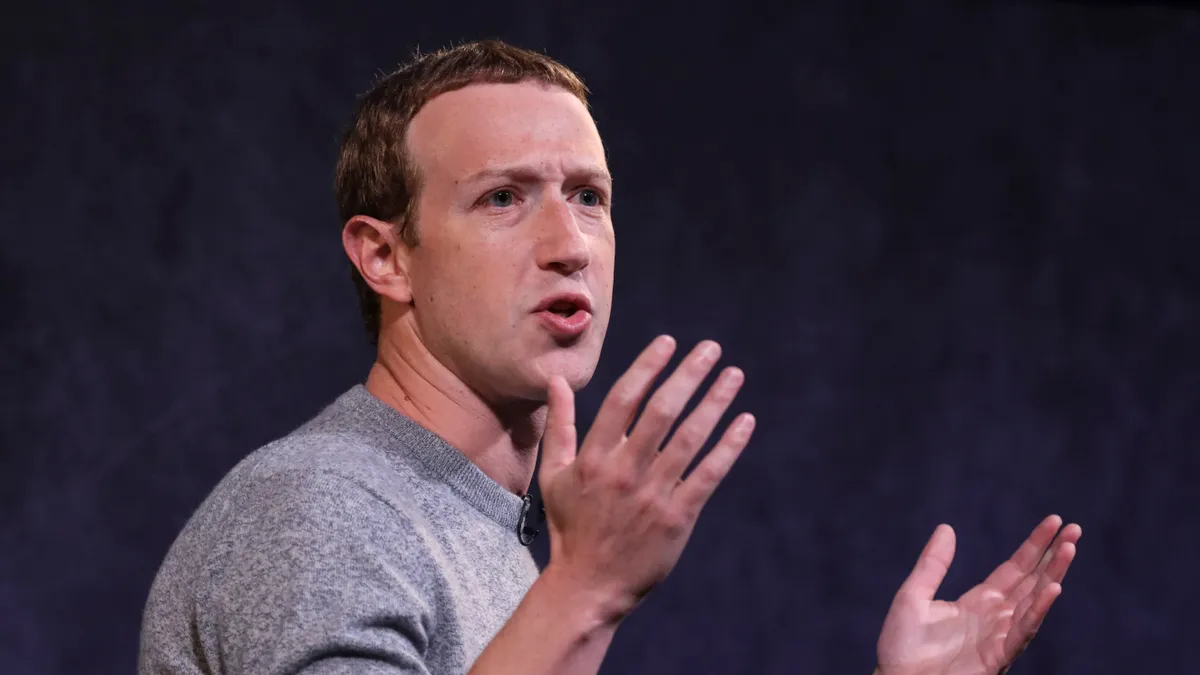Dive Brief:
- Facebook saw revenue from advertising grow 33% year-on-year in the third quarter to $28.3 billion, according to an earnings statement released Monday. Total revenue increased 35% YoY to $29 billion.
- The results, arriving during a dump of leaked documents that have embroiled the company in a PR crisis, missed analyst revenue expectations, with executives attributing the slowdown largely to changes Apple made to user tracking. Moving forward, Facebook plans to prioritize three product areas: Reels, its TikTok lookalike; e-commerce, which is expected to play a larger role around the holidays; and the metaverse, where Facebook plans to invest $10 billion this year.
- On the latter front, Facebook is spinning off its Facebook Reality Labs unit focused on augmented and virtual reality (AR/VR) hardware as a separate reporting segment starting in the fourth quarter. Regarding Facebook's broader vision, CEO Mark Zuckerberg said the company will try to narrow in on offerings catered to younger users who have expressed slipping interest in its apps amid the meteoric rise of rivals like TikTok, which the executive views as one of its most serious threats.
Dive Insight:
Q3 saw Facebook at an inflection point as the social media giant finally felt direct headwinds from Apple device-tracking changes that make it more difficult to target and measure ad campaigns. Facebook for months has warned that the iPhone maker's policy tweaks, which started to take effect at scale in June and July, would put a dent in revenue. Snap, a rival that operates the Snapchat image-sharing app, reported a similar slowdown in its earnings last week.
"It's not a great surprise that Facebook sales were close to consensus. While Apple's requirement that users agree to 'being tracked' is resulting in reported opt-in rates of just 16%, the impact will be gradual, and Facebook likely has a much higher opt-in rate," Mike Woosley, chief operating officer of the ad-tech firm Lotame, said in emailed comments. "They've done a better job in making their case and providing meaningful value."
As part of its App Tracking Transparency Framework, Apple recently made its Identifier for Advertisers an opt-in rather than opt-out feature by default. In an era of heightened data privacy scrutiny, consumers are more hesitant to allow businesses to keep tabs on them online. Short-term solutions to the situation don't appear to be in the cards, indicating that Facebook will continue to encounter performance issues impacting a digital ads business that still makes up the vast majority of its revenue.
"We have to rebuild our targeting and optimization systems to work with less data," Chief Operating Officer Sheryl Sandberg told analysts on a call discussing the Q3 results. "So this is a multiyear effort."
Beyond the iOS tech challenges, Facebook is grappling with more existential questions. A trove of leaked documents shared by a whistleblower set off a weekslong media firestorm and mounting accusations that the company turns a blind eye to problems like hate speech to prioritize profit. Zuckerberg strongly pushed back against the narrative on the earnings call, emphasizing the complexities of running a massive business that tries to balance freedom of expression with clamping down on harmful content. He also suggested Facebook has lost some of its mojo in the quest for general audience growth.
"We are retooling our teams to make serving young adults their North Star, rather than optimizing for the larger number of older people," Zuckerberg said on the call. He defined young adults as between 18 and 25.
"Like everything, this will involve tradeoffs in our products and it will likely mean that the rest of our community will grow more slowly than it otherwise would have," Zuckerberg added, noting it would be a multiyear journey.
TikTok is a clear driver of this shift in thinking, with Zuckerberg calling the video-sharing app "one of the most effective competitors we have ever faced." In response, Facebook is going all-in on its copycat feature Reels, which rolled out globally in August 2020. Later on the call, Sandberg said 60% of Facebook's video revenue now comes from mobile-first video, meaning videos that are shot in the vertical format or are under 15 seconds. Facebook earlier this year introduced financial incentives for creators who might help to fortify fledgling products like Reels and livestreaming.
E-commerce was another big-ticket item heading into a holiday season that's expected to see continued traction for the channel. However, supply chain challenges and labor shortages were painted as reducing advertisers' appetites to generate consumer demand. Looking past short-term disruptions, executives also cautioned that the commerce frenzy that has animated retail since the pandemic's outset is showing signs of cooling off.
"There was a period of time when many people who were able to stay at home ordered things online much more. But now in many places, things have opened up, and people are increasingly making purchases in person," Sandberg said. "That doesn’t mean e-commerce has stopped growing. Businesses are still making the shift online. But e-commerce is no longer growing at the pace it was at the height of the pandemic."
Still, Facebook has big plans for Q4, including daily live shopping experiences with brands like Macy's and Walmart — a tack rival YouTube is also pursuing.
Elsewhere, Facebook continued to push hard on reinventing itself as a "metaverse company," an idea Zuckerberg introduced in Q2. AR/VR products appear to be a central part of that pivot with the spinning off of Facebook Reality Labs. Executives are eyeing the transformation as a way to better centralize experimental bets, including some commerce initiatives.
"If you're in the metaverse every day, then you'll need digital clothes, digital tools, and different experiences," Zuckerberg said. "Our goal is to help the metaverse reach a billion people and hundreds of billions of dollars of digital commerce this decade."














